
Guests
- Vthe award-winning playwright and creator of The Vagina Monologues and V-Day, a global movement to stop violence against women and girls. Her memoir, In the Body of the World, is just out in paperback.
- Kimberlé Crenshawprofessor of law at UCLA and Columbia University. She is a V-Day board member and the founder of the African American Policy Forum.
A movement is growing worldwide to stop violence against women and girls. One Billion Rising for Justice will take place on February 14, Valentine’s Day, in more than 200 countries worldwide, focusing on the issue of justice for all survivors of gender violence and the impunity that protects perpetrators all over the world. The One Billion Rising and V-Day campaigns were launched by playwright Eve Ensler, creator of “The Vagina Monologues,” and highlights the startling statistic that one in every three women on the planet will be raped or beaten in her lifetime. We speak to Eve Ensler and Kimberlé Crenshaw, co-founder of the African American Policy Forum. “Women are putting their bodies at the site where vulnerabilities intersect,” Crenshaw says. “By that I mean where vulnerability to gender violence, vulnerability to economic exploitation, vulnerability to the drug war — all these things come together to create unique risks, many times risks that poor women, marginalized women, women of color face.”
Transcript
AMY GOODMAN: We end today’s show with this new worldwide movement that grew out of the global activist initiative called V-Day to stop violence against women and girls. One Billion Rising for Justice will take place on February 14th, Valentine’s Day, in more than 200 countries worldwide, focusing on the issue of justice for all survivors of gender violence and the impunity that protects perpetrators all over the world. The One Billion Rising campaign was launched by playwright Eve Ensler, creator of The Vagina Monologues, and highlights the startling statistic that one in every three women on the planet will be raped or beaten in her lifetime. That’s over one billion women. The 2014 One Billion Rising events kicked off with the world premiere of this new short film called One Billion Rising at the 2014 Sundance Film Festival.
>> It’s a global movement today, so everyone is dancing all over the world.
It’s part of a global revolution.
In more than 205 countries today, people are rising.
I want to tell you: You are making history. This has never happened before in the world, where 200 countries have come together.
This thing that we are part of today has never happened in the history of the world.
AMY GOODMAN: Well, to talk more about the One Billion Rising for Justice campaign, we’re joined by two guests. Eve Ensler herself, the award-winning playwright and creator of The Vagina Monologues and V-Day, the global movement to stop violence against women and girls, her new book, In the Body of the World, has just come out in paperback. And Kimberlé Crenshaw is with us, co-founder of the African American Policy Forum, professor of law at UCLA and Columbia University, as well as a V-Day board member.
We welcome you both back to Democracy Now! Eve, lay out what the plans are for February 14th.
EVE ENSLER: Well, this year, going off the energy and the mad movement of last year, the coordinators came together from all around the world and decided where they wanted to move was in the direction of justice, that we wanted to deepen the campaign and expand the campaign and really get very specific into the places where violence against women meets economic injustice, gender injustice, racial injustice, environmental injustice. So this year we already are, I think, past the number we had at this time last year. I think we’re up to 175 countries. Women and men are rising around the world to look at those intersections.
And some of the places, for example—some of the things that are happening are in the Philippines, for example. Indigenous women are rising in mines, where lands have been taken from them, where it’s increased poverty, it’s increased the militarization of the mines, which has increased sexual violence. Other places that are rising are in the Congo, for example, where they have—a war has been waging there for 13 years, 14 years, and they’ve seen no reparations and no justice. I mean, there are so many—
AMY GOODMAN: And what are the plans in the Congo for February 14th?
EVE ENSLER: There are going to be huge demonstrations and marches and dances through the streets, and then a concert is going to happen. And I really believe there is a set of demands that they are putting forward to the government looking at the time has come for reparations, and it’s very well organized, and I think it will be a very big rising. I was there last year, where about 10,000 people rose just in Bukavu alone. I think we’re seeing, very excitingly, in India, there are tribunals being held across, I think, 25 states. All the districts of Afghanistan are rising. The states—I think every state in America is rising. Thirteen hundred villages are rising in Bangladesh. And many women are rising to look at political crimes—prisoners in Bangladesh, who were held without justice there, and calling for justice for them. I think—
AMY GOODMAN: Kimberlé, can you talk more about what’s happening in the United States, the organizing that’s going on here?
KIMBERLÉ CRENSHAW: Well, what’s so exciting about what’s going on in the United States is that it’s finally linking many of the movements around domestic violence and violence against women, in general, to a global understanding that these are risks that women face around the world as a group. One of the problems so far, or at least historically, with the domestic violence movement and violence against women, in general, is that many times people didn’t perceive that they were linked. So, there would be an anti-incarceration movement, for example, that wouldn’t necessarily see the links between having experienced domestic violence or other forms of abuse and that being a start or a pathway into incarceration, or vice versa.
So what’s happening here is that women are putting their bodies at the site where vulnerabilities intersect. By that, I mean where vulnerability to gender violence, vulnerability to economic exploitation, vulnerability to the drug war—all these things come together to create unique risks, many times risks that poor woman, marginalized women, women of color face. So the idea is that if you—if you basically decentralize, if you encourage women to put their bodies, literally, at the sites where they are not safe and should be, or where they’re not experiencing justice and they have a right to expect that, if you put them in motion and allow them to articulate the ways in which all of these vulnerabilities actually constitute the conditions of their lives, then that makes for a national movement, and it links it to a global movement.
AMY GOODMAN: Can you explain the issue of intersectionality?
KIMBERLÉ CRENSHAW: Well, I can explain it with an example. If you just look at President Obama’s State of the Union address, there’s a great example there. In one sentence, he talks about the economic marginality of men of color and the need to have programs at the foundation level to address them, and in the next paragraph, he talks about the economic marginality of women. But if you were to really ask where do women of color show up, women of color make—African-American women of color make 66 cents for a dollar that a white man makes, Latinas 56 cents. You didn’t hear that when he talked about women, and you didn’t hear it when he talked about men of color. You wouldn’t know African-American women, their median net worth is a hundred dollars. That means that they experience all sorts of risks that actually lead to violence, and their ability to handle violence when it happens is compromised.
So intersectionality draws attention to the fact that women of color are caught between race, gender, class, and most of the time, the ways in which they’re vulnerable is not discussed. So what’s beautiful about this movement, it allows women to discuss it. Our State of Female Justice events, we had one in New York. We’re having one at UCLA on Thursday. It allows all these issues to come to the fore.
AMY GOODMAN: You’re heading out today to California.
KIMBERLÉ CRENSHAW: Yes.
AMY GOODMAN: If you can make it out of the slush and the snow that’s coming down here.
KIMBERLÉ CRENSHAW: If we’re lucky.
AMY GOODMAN: Explain what these State of Justice panels are.
KIMBERLÉ CRENSHAW: So, we might draw an analogy to what happened during the civil rights movement. There was the daily action that put bodies in the street, and then there was what they did at night. They came together. They talked about the issues. They drew examples from each other. And they built community. Well, that’s what the State of Female Justice panels do. We’ve had several here in the United States, but they’ve also gone on around the world. It creates the common language, so that even though women experience vulnerability differently, we’re able to see how the issues are connected.
AMY GOODMAN: Eve, your book, In the Body of the World, is now coming out in paperback this week. How does this relate to One Billion Rising?
EVE ENSLER: Well, I think so much of what we’re talking about is the body, right? And the body of women, the body of the Earth, the body of justice, and so many sites this year—and what is this action? It’s an action of dance. It’s an action of re-inhabiting your body. It’s an action of reclaiming public space with your body, which has been taken away from you through various forms of violence. And it’s so beautiful to look at all the videos and all the posters that are coming around the world, because bodies are such an intrinsic part of what this movement’s about.
And we’re seeing people dancing in places where they never felt free to dance. You know, in the Philippines, for example, every day this month they are doing an action in front of the Payatas, in front of the hospitals to demand the end of privatization of medicine and healthcare. They’re dancing in front of courthouses.
And I think there’s something about when trauma and violence happens to your body, we leave our bodies. We leave the center of our power, the center of our creativity, the center of our resource. And dancing, and also collective dancing, brings us back into our central energy and power. My book is a lot about cancer and Congo and the coming together of those two things, because—
AMY GOODMAN: You survived cancer.
EVE ENSLER: I did, and I’m really happy to be here. And I think, when we can transform and re-enter our bodies, we can really begin, as women and women collectively, to have a vision of what—and feel what’s going on and connect with what’s going on and know we’re part of the story. And I’ve heard from so many women last year who danced publicly, they hadn’t danced in public space ever, they never felt it was theirs, they never felt safe enough, but with the community and with a direct intention to reclaim that space and make it safe for women, they came back into their bodies.
AMY GOODMAN: What is happening in India with this—for the first time in the last year, the kind of attention that’s being paid to gang rape?
EVE ENSLER: Well, I have to say, I was there for three weeks in December, and it’s—I think it’s remarkable what’s going on in India. There is this unearthing of the truth, unearthing of the story. I was just on the phone last night with activists in India, and I think one of the best things about One Billion Rising for Justice is it’s owned, it’s self-directed, it’s determined by people on the ground. Actually, everybody owns this movement. There’s no kind of central point of ownership. It’s if you want to do it, go and do it. And they were saying to me, right now in India, it looks like probably all states are rising. They were talking about this beautiful action that’s gone on where rickshaw drivers have been sensitized so that 100,000 rickshaw drivers now have on their rickshaws, “My religion is respecting women.” So there are all these beautiful initiatives that are happening, by men and women. But I think India in some ways is the epicenter of this movement right now. There is just this—
AMY GOODMAN: We have 20 seconds.
EVE ENSLER: —wonderful energy that’s emerging there.
AMY GOODMAN: And if people want to find more about how to connect to this movement on Valentine’s Day, February 14th?
EVE ENSLER: OneBillionRising.org. There’s a huge—there are lots of actions in New York, in Atlanta at the Ebenezer Baptist Church, where Dr. King, you know, led the way. They’re joining forces there with the women’s movements and the civil rights movements. And you can go on and sign up, do your own action or join one of the big actions in your neighborhood.
AMY GOODMAN: I want to thank Eve Ensler, the award-winning playwright, and Kimberlé Crenshaw, the founder of the African American Policy Forum, for joining us.

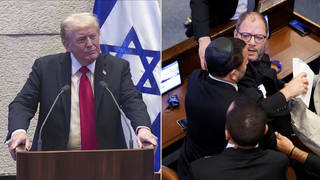

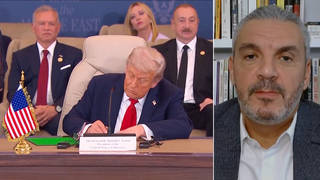
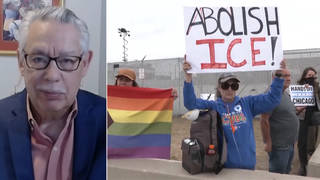





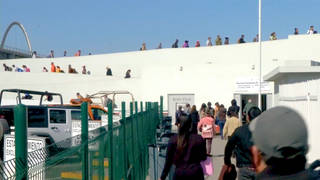
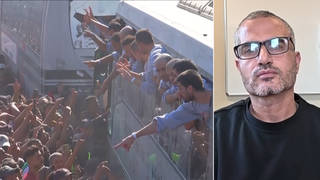
Media Options